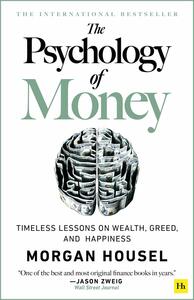Take a photo of a barcode or cover
challenging
informative
fast-paced
Really interesting perspective on finances
As someone who doesn’t know that much about economics/finance/etc, this was an accessible introduction to the ways that we think about money, an overview on how we got here, and principles that guide what individuals should do next. Each chapter illustrates a simple yet important concept until the last one where the author reveals what he does with his money. After a few days, I find myself thinking a lot about the post script, the making of the modern American consumer from a historical perspective. The story we tell ourselves about ourselves and about the economy is important, this book crystallizes why. People are complicated.
I feel like this is a book best read chapter by chapter with pauses in between (not straight through or as an audio book on double speed) if you’re inclined to just read a summary, ch 19 is basically a chapter by chapter breakdown of the book on 3ish pages.
I feel like this is a book best read chapter by chapter with pauses in between (not straight through or as an audio book on double speed) if you’re inclined to just read a summary, ch 19 is basically a chapter by chapter breakdown of the book on 3ish pages.
Morgan Housel doesn't give financial advice or even one-size-fits-all recommendations, which makes the principles in this book feel timeless.
Highly recommend!
Highly recommend!
informative
inspiring
reflective
medium-paced
Really interesting read, gave me a lot to think about. Super easy to digest and engaging.
hopeful
informative
fast-paced
informative
reflective
No theories or models, no concrete steps to take or detailed analysis, so if you’re looking for that you will be disappointed. Instead, a handful of broad but sensible pieces of advice, such as:
Some people might even call it common sense, but I’ve learned to lower my expectations regarding how much of common sense actually is common.
In short: only read if you know nothing about money and psychology.
In a bit longer:
This book is brief, harmless and easy to read (that’s neither a plus nor a minus) but it's a tad repetitive and fluffed up, especially the first few chapters. It's also very US-centric, which even a European like me, who almost has the same way of life excluding the night terrors about medical bills and student loans, found unrelatable in places.
With "The Psychology of Money" as title I was expecting a bit more references to neurological and psychological studies. Alright, I get it, this is a self-help book, not a PhD thesis. But at least, I don't know... how hard would it have been to tack on, somewhere in the vicinity of this sentence:
the name of this phenomenon, aka "confirmation bias"?
And what about "The idea that a few things account for most results [...]"? Why not drop that it's called the "Pareto principle" while you're at it?
The second-to-last chapter basically says: "there is no right advice about money since everyone has a different history and varying goals and you shouldn't let other people influence you”. Then the last chapter can be summed up as: "But here’s what I do anyway".
To show Mister Housel that I was paying attention, I skipped the last chapter.
Nothing is as good or as bad as it seems.
There is no reason to risk what you have and need for what you don't have and don't need.
Having a strong sense of controlling one's life is a more dependable predictor of positive feelings of wellbeing than any objective conditions of life we have considered.
A good rule of thumb for a lot of things in life is that everything that can break will eventually break.
The short sting of pessimism prevails while the powerful pull of optimism goes unnoticed.
Coming to terms with how much you don’t know means coming to terms with how much of what happens in the world is out of your control.
Some people might even call it common sense, but I’ve learned to lower my expectations regarding how much of common sense actually is common.
In short: only read if you know nothing about money and psychology.
In a bit longer:
This book is brief, harmless and easy to read (that’s neither a plus nor a minus) but it's a tad repetitive and fluffed up, especially the first few chapters. It's also very US-centric, which even a European like me, who almost has the same way of life excluding the night terrors about medical bills and student loans, found unrelatable in places.
With "The Psychology of Money" as title I was expecting a bit more references to neurological and psychological studies. Alright, I get it, this is a self-help book, not a PhD thesis. But at least, I don't know... how hard would it have been to tack on, somewhere in the vicinity of this sentence:
The more you want something to be true, the more likely you are to believe a story that overestimates the odds of it being true.
the name of this phenomenon, aka "confirmation bias"?
And what about "The idea that a few things account for most results [...]"? Why not drop that it's called the "Pareto principle" while you're at it?
The second-to-last chapter basically says: "there is no right advice about money since everyone has a different history and varying goals and you shouldn't let other people influence you”. Then the last chapter can be summed up as: "But here’s what I do anyway".
To show Mister Housel that I was paying attention, I skipped the last chapter.
informative
inspiring
reflective
medium-paced





